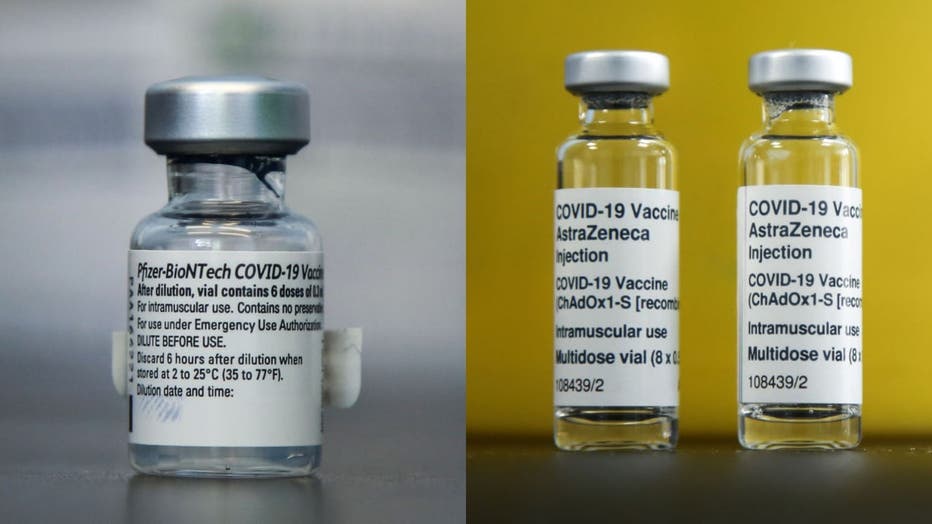Mixing AstraZeneca, Pfizer COVID-19 vaccines provides ‘robust’ protection, study says
A pre-clinical study published in The Lancet on June 25 found that mixing AstraZeneca with a second dose of Pfizer provides "robust" protection from severe COVID-19.
The pre-clinical study was conducted in the United Kingdom beginning in February with 830 people enrolled to receive one of four combinations of vaccines.
Participants either got two doses of Pfizer, two doses of AstraZeneca, or one dose of Pfizer and a dose of AstraZeneca and vice versa.
People who received a dose of AstraZeneca and then a dose of Pfizer’s COVID-19 vaccine received just as much protection as the people who received two doses of Pfizer, the study found.

FILE - Vial of Pfizer-BioNTech COVID-19 vaccine and vials of AstraZeneca COVID-19 vaccine photo collage.
RELATED: Pfizer, Moderna COVID-19 vaccines likely offer long-lasting protection, study finds
People who received a dose of Pfizer followed by AstraZeneca saw higher rates of protection from the novel coronavirus in comparison to those who received two doses of AstraZeneca, but not as much protection as those who received two Pfizer doses or a dose of AstraZeneca followed by Pfizer.
The study also found that mixing vaccines actually prompted the body to create higher counts of antibodies that are ready to fight off the virus as opposed to getting two doses of the same vaccine, but the study did not provide further details on why.
"The highest antibody response was seen after the two-dose Pfizer-BioNTech schedule, and the highest T cell response from Oxford-AstraZeneca followed by Pfizer-BioNTech," Oxford University said in a news release.
"Today’s data are a vital step forward, showing a mixed schedule gives people protective immunity against COVID-19 after four weeks," Deputy Chief Medical Officer Professor Jonathan Van-Tam said in the news release.
Being able to mix vaccines could help optimize the global vaccine supply and get shots in the arms of communities that have limited access to healthcare.
RELATED: As delta variant rises globally, US targeting younger adults for vaccines
"In the era of multiple COVID-19 vaccines having approval for emergency use, the paramount issue in solving the COVID-19 pandemic is now to optimise global vaccine coverage rate using the currently available vaccines. The positive results from our study support flexibility in use of heterologous prime boost schedules using ChAd (AstraZeneca) and BNT (Pfizer), which can contribute to the acceleration of vaccine roll-out," the study concluded.
Dr. Matthew Snape, co-author of the study, also noted during a news conference on Monday that while the results of the recent study he and his colleagues conducted show promising results, the best course of action is to receive two doses of the same vaccine, The Times reported.
Similarly, the National Institutes of Health (NIH) initiated an early-stage study earlier this month testing mixed COVID-19 booster vaccine schedules among fully vaccinated adults.
The NIAID-funded study involves some 150 people who already received one of the authorized COVID-19 vaccine regimens developed by Pfizer, Moderna or Johnson & Johnson.
RELATED: EU doesn’t renew order for AstraZeneca's COVID-19 vaccine after inking deal with Pfizer
"Although the vaccines currently authorized by the U.S. Food and Drug Administration offer strong protection against COVID-19, we need to prepare for the possibility of needing booster shots to counter waning immunity and to keep pace with an evolving virus," Dr. Anthony S. Fauci, director of the National Institute of Allergy and Infectious Diseases (NIAID), said in a release posted June 1. "The results of this trial are intended to inform public health policy decisions on the potential use of mixed vaccine schedules should booster doses be indicated."
FOX News contributed to this report.

